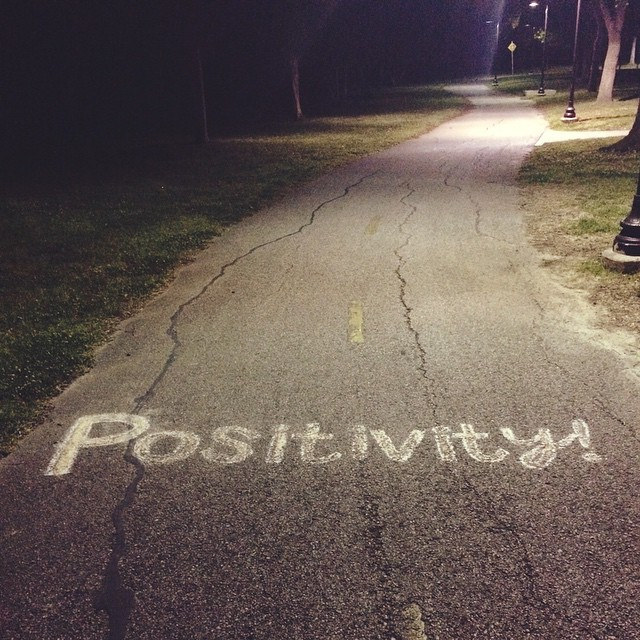
Recently, I've had to tell a few coaches and coach training schools that are claiming the credential, "Certified Positive Psychology Coach", that they need to stop, because it is trademarked.
Most are great about it and make the necessary changes right away. But one school, which I suspect has knowingly used our trademark for some time (maybe I'm wrong), is giving us push-back. This violates virtually every code of ethics in the profession of coaching and is a disservice to the students they are certifying. If you are one of those graduates, this is not great.
The usual protocol for notifying colleagues you believe are infringing on your copyrights or trademarks is to have your attorney send a letter and escalate from there if there is no response, but coaching works best when we treat each other with courtesy and respect, so often we begin with a nice personal note and only escalate if it is ignored. The second step is to notify the ICF, because this is an ethics violation, and the final step is to turn it over to attorneys.
[UPDATE] This post has been updated, because I realized I was feeling insulted when I first wrote it and that's not where I want to be coming from. The response of that one school was inappropriate and a comment on their website actually claims other positive psychology coaching programs are just selling information they got freely off the internet. I don't know anyone who is doing that and that comment reflects poorly on the writer.
I can't speak for other schools, or teachers, but for the record, I've spent years formally researching positive psychology, coaching, and related topics for my dissertation. But yes, tons of information on positive psychology is freely available on the internet and if you want to read the latest research that's been published, you can join the Institute of Coaching, at McLean Hospital, Harvard University, which subscribes to expensive research journals for its members and even reviews pertinent papers, which helps members select which papers they want to include in their own research. Members of the Certified Positive Psychology Coach® Program can join the IOC at a discount (currently only $100 per year), because I'm a Founding Fellow and my school is a Sponsor of IOC.
That last perq is helpful to our students, because they are required to do a little research of their own to graduate. A few are PhDs, who are already seasoned researchers, but those who aren't get an introduction to qualitative research and discover that it's not so hard and that they can feel confident about their work and knowledge and never need feel intimidated by well-known researchers or academics. Other requirements for graduation include coaching at the proficient-to-masterful range, which helps make this program unique.
The main reason the Certified Positive Psychology Coach® credential is trademarked...
The main reason I trademarked it is to establish a standard of excellence. Read below for why I thought that was necessary. A secondary reason was that our coach training program was named after that certification. So if ever someone else trademarked the name, I would have to go to court to defend it and if I lost, would have to change much more than my certification. So the reasons were primarily professional, but also business-based.
What is actually trademarked are those four words, in that order, capitalized or not. We neither challenge whether other positive psychology coach training programs have merit nor whether they have a right to certify their graduates. In fact, I think a few other programs are great, but we all have different strengths. That’s how it should be. It makes us distinct to potential students who need to decide which school to join.
That said, our graduates jump through several hoops and need to coach at a higher level by the time they get certified, which is one of the reasons they do so well after graduation, so we want to keep their certification distinct in the marketplace.
Here’s a bit about my background that may explain this point of view: After teaching in academia during the 80’s and 90’s, I trained with
Thomas Leonard, the founder of the coaching profession (
also the founder of both the ICF and IAC), and I quickly moved into training and mentoring coaches at, what was then, the largest coach training school in the world. I was their lead certifier. That gave me an early opportunity to train thousands of coaches in advanced skills and get them certified and on to successful careers. I quickly developed expertise and became known as a go-to person for advanced training and certifications. I launched my own coaching school (School of Coaching Mastery) a couple of years later.
I’ve studied positive psychology, both formally and informally, for about twenty years. Like most lifelong learners, I take advantage of a variety of sources of education, whether graduate school or even a free MOOC, now and then. Right now, I’m back at school for yet another degree and my dissertation, which I’m still writing, is on an aspect of positive psychology coaching that has been neglected.
Several years ago, I noticed positive psychology programs proliferating. Many included some basic coach training, but not enough to support professional coaching. People registered for the programs, thinking they would become professional coaches, but discovered they weren’t well prepared. I think that’s unfair to the students.
I knew what they needed to know and I knew how to teach it to them.
I was already teaching positive psychology to coaches and my students were asking for more. I was ready to teach advanced positive psychology coaching, as the demand began to rise. So I researched what else was available, at the time, and was shocked that there was no certification in positive psychology coaching, because in my opinion, positive psychology and coaching are made for each other. A legal team did a further exhaustive search, as did the US Patent and Trademark Office. The phrase, Certified Positive Psychology Coach, was available and I registered it.
A major difference between academia and coach training: is that academia has hundreds of years of rules, customs, and protocols, not to mention accreditation, that helps keep standards where they need to be. It’s an imperfect system, but generally, it works. Otherwise, everyone could have a PhD and those letters would mean nothing.
Coaching was still in its infancy when I joined it and it had none of that infrastructure. It was the wild west. The freedom and creativity helped it grow and develop exponentially, but there’s a dark underbelly and people get hurt. I’ve known people who went bankrupt or lost their homes because of unscrupulous “coaches”. Overtime, organizations, like the ICF, began developing standards, ethics, and certifications.
The ICF has registered trademarks for the names of their certifications, because they are challenging credentials to earn and represent high standards. Plus trademarking protects certified coaches and helps establish reliable brands that clients trust. Otherwise, people could sell the "ICF MCC" on Udemy for $12, with no effort, and ICF certification would be meaningless.
So although I’m all for creativity and freedom, I’m also for high standards and ethics. It’s a balancing act. In the absence of hundreds of years of customs and laws, not to mention the US Dept. of Education, coaching uses a different set of tools to establish appropriate boundaries to protect coaches and their clients. Among those tools are copyrights and trademarks. This system is imperfect, but it generally works.
That’s why I registered the trademark for Certified Positive Psychology Coach®, because I know the level of coaching that most coaches need to succeed and I wanted to protect that level of coaching in positive psychology for the sake of my students, who work hard for this credential, and their clients, who deserve high-quality coaches. I'm not saying other coaches aren't good, nor am I saying other training programs aren't good, just that they aren't training at an equivalent level.
Nobody likes getting an email that says they can't use a specific name in their business, but there's no point in casting the owner as the villain. Most of us just make the changes and move on.
I founded the Association of Positive Psychology Coaches, along with my students. And I am considering giving this trademark to the APPC, after it is completely separate from my school, if there are enough equivalent schools to make it worthwhile, and if APPC ever develops that much clout. Why? Many people prefer to hire coaches with certifications from well-known not-for-profit organizations, because schools have widely differing requirements. Then APPC could license qualifying schools. Right now, there are a couple other positive psychology coaching schools that are approved by the ICF for ACC (entry-level certification) training and they are probably great programs. My programs is approved to train coaches at the ACC, PCC, and MCC levels, so in my opinion, it is more advanced, at least when it comes to coaching skills.
If you've received a "Certified Positive Psychology Coach" certification from an organization that doesn't have permission to use it, the bad news is that you can't claim that certification. That sucks. The good news is we will waive some of our requirements for you so you can complete a legitimate Certified Positive Psychology Coach®. Then you can use it proudly and with no worries. Best we can do.
If you're curious about the Certified Positive Psychology Coach® Program, see below. We can waive some requirements for people who already have training in coaching and/or positive psychology.




















